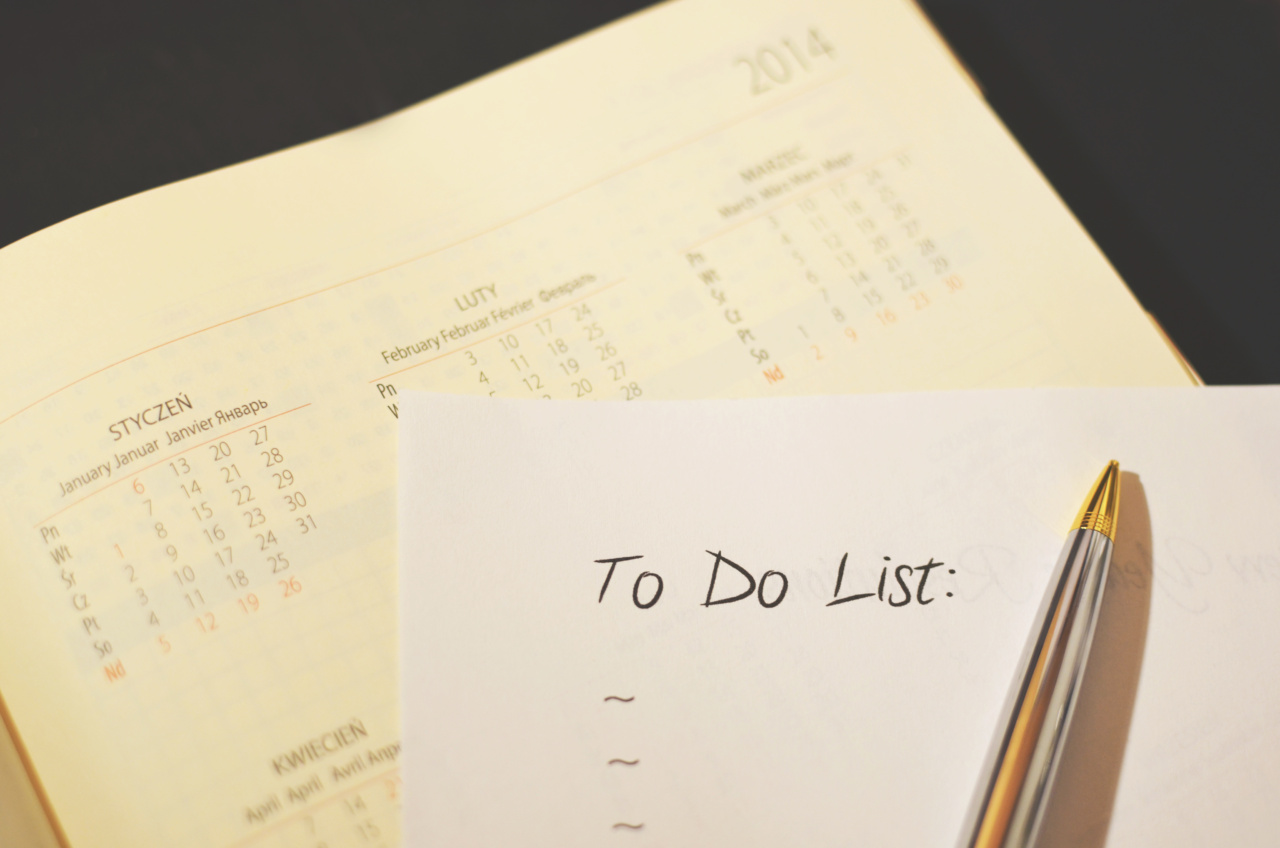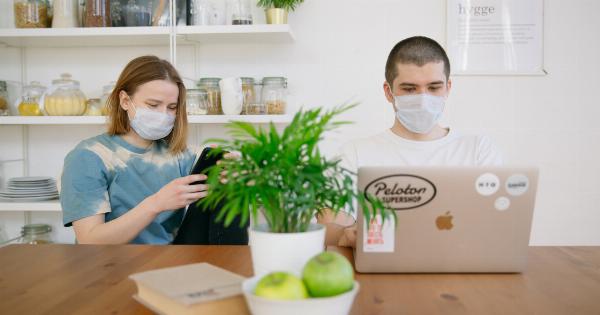Sick days can be challenging, but with the right preparation and self-care, you can make the most of your time off and ensure a speedy recovery.
Whether you’re dealing with a common cold, flu, or any other illness, having a checklist of essential items and activities will help you feel better and get back on your feet faster.
1. Stock Up on Essentials
When you’re feeling under the weather, the last thing you want is to run out of supplies. Make sure to have the following essential items on hand:.
- Tissues: Stock up on soft tissues to soothe your runny nose.
- Medications: Have over-the-counter pain relievers, cough syrup, and any prescribed medications within reach.
- Fluids: Stay hydrated with plenty of water, herbal tea, and electrolyte drinks.
- Comfortable clothing: Opt for loose and cozy clothes that allow for easy movement and keep you warm.
- Thermometer: Monitor your temperature regularly to track your progress.
- Absorbent pads: In case of a fever or excessive sweating at night, keep some absorbent pads handy.
2. Create a Comfortable Environment
A cozy and comforting environment can have a significant impact on your recovery. Consider the following tips:.
- Temperature control: Adjust the thermostat to a comfortable temperature that suits you.
- Soft lighting: Dim the lights or use soft lamps to create a relaxing ambiance.
- Extra pillows and blankets: Surround yourself with fluffy pillows and warm blankets to enhance relaxation and sleep.
- Aromatherapy: Use essential oils or scented candles to create a soothing atmosphere.
- Organize your bedside essentials: Keep your medications, tissues, and a water bottle within easy reach.
3. Prioritize Rest and Sleep
One of the most effective ways to recover from an illness is to allow your body to rest and get plenty of sleep. Here are some tips to prioritize rest:.
- Clear your schedule: Cancel any non-essential commitments and give yourself permission to take time off.
- Create a sleep routine: Establish a consistent bedtime and wake-up time to regulate your body’s internal clock.
- Limit screen time: Avoid excessive exposure to screens, especially before bedtime, as it can interfere with your sleep quality.
- Practice relaxation techniques: Try deep breathing exercises or guided meditation to relax your mind and body.
4. Nourish Your Body with Nutritious Foods
Proper nutrition is crucial for a healthy recovery. While you may not have much of an appetite while you’re sick, try to consume the following:.
- Hot soups: Opt for nutrient-rich soups that are easy to digest, such as chicken noodle or vegetable soup.
- Fruits and vegetables: Consume vitamin C-rich foods like citrus fruits, berries, and leafy greens.
- Herbal teas: Sip on herbal teas like chamomile or ginger tea to soothe your throat and alleviate congestion.
- Protein-rich foods: Include lean proteins like chicken, fish, tofu, or legumes to support your immune system.
5. Practice Self-Care Activities
Engaging in soothing self-care activities can make a tremendous difference in how you feel during your sick days. Consider the following self-care practices:.
- Gentle stretching or yoga: Perform gentle stretches or try simple yoga poses to enhance blood circulation and ease muscle tension.
- Read or watch movies: Escape into a captivating book or watch your favorite movies to divert your mind and relax.
- Take warm baths: Soak in a warm bath with Epsom salts or essential oils to soothe your body and calm your senses.
- Listen to calming music: Create a playlist of soothing melodies or nature sounds to promote relaxation and well-being.
- Write in a journal: Express your thoughts and feelings by journaling, allowing for emotional release and self-reflection.
6. Stay Hydrated
Proper hydration is essential when you’re sick. Drinking enough fluids helps thin mucus, relieve congestion, and prevent dehydration. Follow these tips:.
- Set a fluid intake goal: Aim to drink at least 8-10 cups of fluids throughout the day.
- Drink warm liquids: Sip on warm water, herbal teas, or broths to soothe your throat and alleviate congestion.
- Avoid caffeine and alcohol: These substances can dehydrate your body, so it’s best to steer clear of them while you’re sick.
- Use a humidifier: If the air in your home is dry, consider using a humidifier to add moisture to the environment.
7. Seek Support from Loved Ones
During sick days, it’s essential to reach out to your loved ones for support. They can offer assistance, comfort, and provide a much-needed emotional uplift. Here’s how to seek support:.
- Inform your workplace or school: Let your employer, supervisor, or teacher know that you’re unwell and won’t be available.
- Ask for help with daily tasks: Don’t hesitate to ask friends or family members for help with groceries, cleaning, or cooking.
- Stay connected: Use technology to stay in touch with loved ones, whether through phone calls, video chats, or messaging apps.
- Open up about your feelings: Share your concerns and emotions with someone you trust, as it can provide relief and comfort.
8. Stay Positive and Practice Gratitude
Maintaining a positive mindset and practicing gratitude can greatly contribute to your overall well-being and recovery. Try these strategies:.
- Affirmations and positive self-talk: Repeat positive affirmations or use uplifting phrases to boost your mood and outlook.
- Express gratitude: Take a moment each day to write down or reflect upon things you’re grateful for, no matter how small.
- Visualize healing: Imagine yourself getting better and visualize your body fighting off the illness.
- Engage in hobbies: If you feel up to it, indulge in activities you enjoy, such as painting, knitting, or playing an instrument.
9. Follow Medical Advice
It’s essential to follow the advice and instructions given by your healthcare provider. Here are some important guidelines:.
- Take medications as prescribed: Follow the recommended dosage and frequency of any prescribed medications.
- Rest and recuperate: Avoid strenuous activities and allow your body to heal at its own pace.
- Attend follow-up appointments: Keep track of any follow-up appointments or tests recommended by your doctor.
- Monitor your symptoms: Pay close attention to any changes in your symptoms and report them to your healthcare provider.
10. Gradually Resume Activities
As you start to feel better, it’s crucial to gradually resume your normal activities to prevent setbacks. Keep these tips in mind:.
- Listen to your body: Pay attention to any signs of fatigue or discomfort and take breaks accordingly.
- Start with light exercise: Begin with gentle exercises like walking or stretching before gradually increasing intensity.
- Resume work or school gradually: If possible, gradually reintegrate yourself into your professional or academic responsibilities.
- Practice good hygiene: Maintain good hygiene practices, such as washing your hands frequently and using hand sanitizer.
By following this ultimate checklist for sick days, you can ensure a smoother recovery and prioritize your well-being. Remember, rest, self-care, and patience are key to a speedy recovery.
Take this time to take care of yourself and emerge stronger and healthier.































